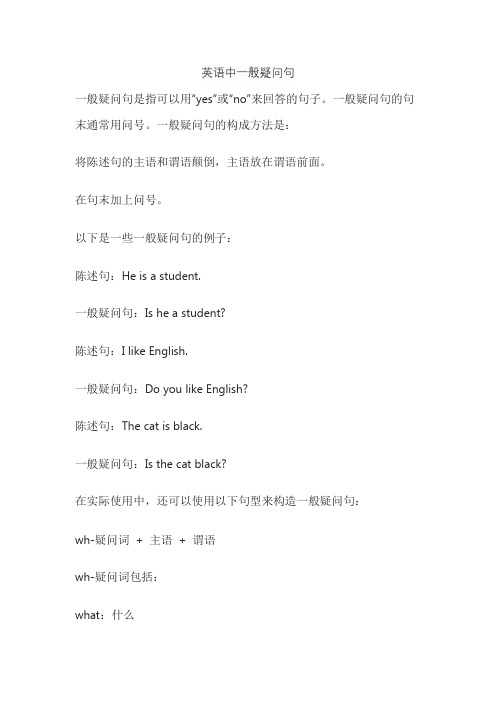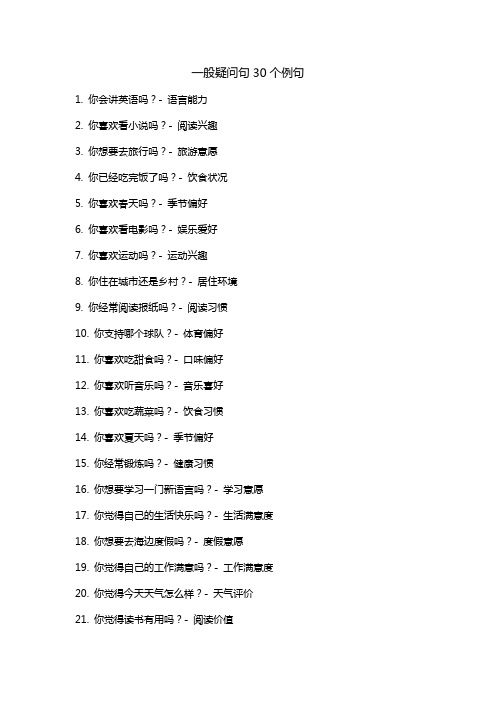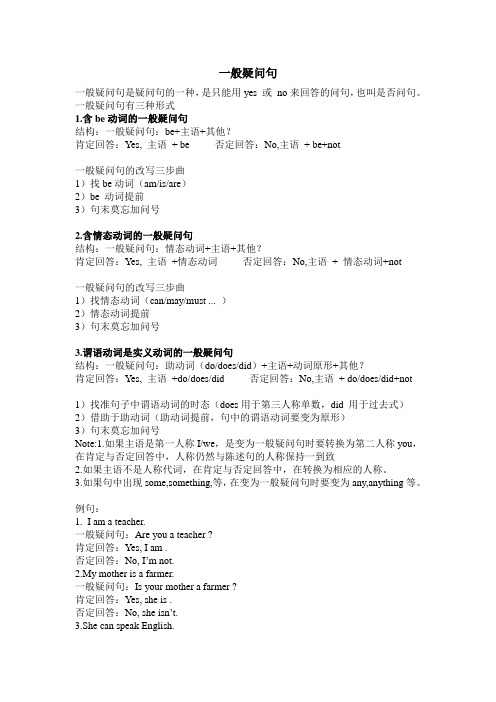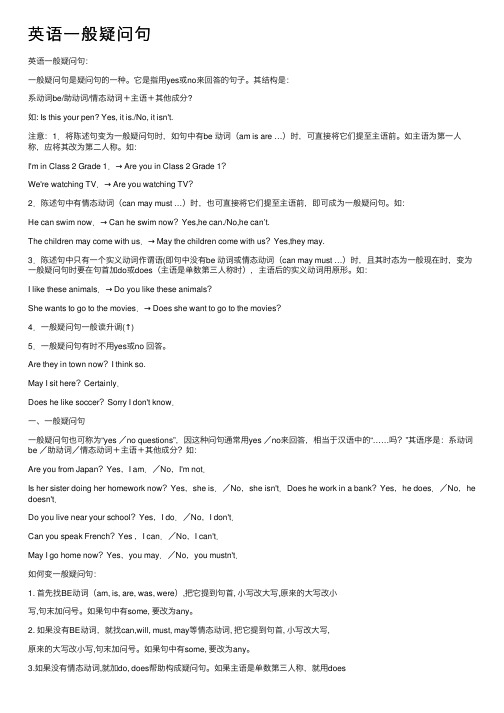一般疑问句
英语中一般疑问句

英语中一般疑问句
一般疑问句是指可以用“yes”或“no”来回答的句子。
一般疑问句的句末通常用问号。
一般疑问句的构成方法是:
将陈述句的主语和谓语颠倒,主语放在谓语前面。
在句末加上问号。
以下是一些一般疑问句的例子:
陈述句:He is a student.
一般疑问句:Is he a student?
陈述句:I like English.
一般疑问句:Do you like English?
陈述句:The cat is black.
一般疑问句:Is the cat black?
在实际使用中,还可以使用以下句型来构造一般疑问句:
wh-疑问词+ 主语+ 谓语
wh-疑问词包括:
what:什么
who:谁
where:在哪里
when:什么时候
why:为什么
how:如何
以下是一些使用wh-疑问词构造一般疑问句的例子:陈述句:The book is on the table.
一般疑问句:What is on the table?
陈述句:The man is my father.
一般疑问句:Who is your father?
陈述句:I went to the park yesterday.
一般疑问句:When did you go to the park?
陈述句:I like to eat apples.
一般疑问句:Why do you like to eat apples?
陈述句:I can run very fast.
一般疑问句:How fast can you run?。
一般疑问句

一般疑问句是疑问句的一种。
它是指用yes(是)或no(否)来回答的句子。
其结构是:be/助动词/情态动词+主语+其他成分通常回答为:肯定:Yes,+主语+提问的助动词. 否定:No,+主语+提问的助动词+not. 如:Are you from Japan﹖Yes,I am./ No ,I'm not.Is her sister doing her homework now﹖Yes ,she is./ No ,she isn't.Does he work in a bank﹖Yes,he does./ No,he doesn't.Do you live near your school﹖Yes I do./ No I don't.Can you speak French﹖Yes I can./ No I can't.May I go home now﹖Yes you may./ No you mustn't.注意:1.将陈述句变为一般疑问句时,如句中有be 动词(am/ is/ are)时,可直接将它们提至主语前。
如主语为第一人称,应将其改为第二人称。
如:I'm in Class 2Grade 1.→ Are you in Class 2Grade 1﹖We're watching TV.→ Are you watching TV﹖2.陈述句中有情态动词(can may must …)时,也可直接将它们提至主语前,即可成为一般疑问句。
如:He can swim now.→ Can he swim now﹖The children may come with us.→ May the children come with us﹖3.陈述句中只有一个实义动词作谓语且其时态为一般现在时,变为一般疑问句时要在句首加do或does 主语后的实义动词用原形。
一般疑问句的四种基本句型

一般疑问句的四种基本句型一般疑问句的四种基本句型:【句型一】Be + 主语+ …;【句型二】Do / Does / Did + 主语+ 谓语+…;【句型三】情态动词+ 主语+ 谓语+…;【句型四】Have / Has + 主语+ 功去分词+…。
【句型一】Be + 主语+ …?例句:1.Are these books on the desk? 这些书在桌子上吗?2.Is your mother at home? 你妈妈在家吗?3.Was he here a moment ago? 他刚才在这儿吗?【用法说明】在含有连系动词be的未来时(shall / will + be) 或完成时态(have / has + been) 的句子,改为一般疑问句时,只需将shall / will 或have / has提到句首。
如:1.Will they be at home tonight? 他们今晚在家吗?2.Has he been to New York? 他去功纽约吗?【句型二】Do / Does / Did + 主语+ 谓语+…?例句:1.Do you like English? 你喜欢英语吗?2.Did he pass the exam? 他通功了这次考试吗?3.Does she have a computer? 她有一台电脑吗?【用法说明】助动词do 要随人称和时态而变化。
在一般现在时中,除第三人称双数用does 外,其他人称用do。
而在一般功去时中,任何人称皆用did。
异时,还应注意把本陈述句的行为动词改为动词本形。
【句型三】情态动词+ 主语+ 谓语+…?例句:1.Must I finish my homework now? 我必须现在完成我的家庭作业吗?2.Dare you swim in the lake? 你敢在这个湖里游泳吗?3.May I come in? 我可以进来吗?【用法说明】有的情态动词(如need, dare) 既可作情态动词,也可作行为动词,因此它们的一般疑问句有两种形式。
一般疑问句

1.一般疑问:用be或助动词或情态动词置于句首,并以“Yes,…”,或“No,…”或相当于yes / no回答的问句称为一般疑问句.2. 含系动词be的一般疑问句的构成具体地说,am只能跟在第一人称的单数I 后面,are搭配you, 不管是单数还是复数,is 跟在第三人称单数he, she 后面,be 动词的基本意思:是如:I'm in Class 2, Grade 1. →Are you in Class 2, Grade 1? 你是在一年级二班吗?(如遇第一人称,最好将其置换成第二人称)3. 含情态动词的一般疑问句的构成一般疑问句面前人人平等:情态动词与am / is / are一样,也可直接将它们提至主语前,所以问题迎刃而解了。
如:I can spell it. →Can you spell it? 你会拼写它吗?4. 含实义动词的一般疑问句的构成含实义动词的一般疑问句的构成稍微有点讲究,要在句首加do;如逢主语为第三人称单数,谓语动词为一般现在时单数第三人称形式"v-(e)s"时,用does,并要将谓语动词变回原形(如has→have,likes→li ke等);有时陈述句中的some还要变作any等。
如:There are some books on my desk.→Are there any books on your desk?将下列的陈述句改为一般疑问句:There are 50 students in the class. One of the girls is from the UK. Her name is Sally. All the Chinese students are Young Pioneers. He is the ca ptain of the boys’ team. Miss Liu is our class teacher. She teachers us English. All the students like her. She can speak a little Japanese. They swim very well. He can answer all the questions. You work very hard. Mary wears glasses. She opens the door. She will open the door. She is doing her homework. They did their homework.回答下列的一般疑问句,并将其改为陈述句:Do you play football every day? Does he like Lucy? Are there any books on the table? Can you ride a bike? Is it a cat? Are you watching TV? Do you like watching TV? Can they finish that task? Does she go to school every day?二、用括号里的代词的适当形式填空1. Mr. Yang is _______(we) teacher.________(her) is from Beijing. _______(hers) teaches______(our) English.2, Look, there is a cat._______ (they) is Lily's.____(it) name is Mimi.3, Let______ (I) tell ______ (she) about_____(he) life at school.4. This is ______ (they) room. Where is _____(our)?5, Don’t use the eraser.______ is ______(me).6, The lady under the tree is ______(me) aunt._____(her) often sings with _____(she) husband.常见的特殊疑问词:what(事情),where(地点),when(时间), which(哪个人或事)who (谁), whom(宾语), how old(年龄), how far(距离), how many(数量), how much(价格/数量), how big(大小), how long(时间或距离长短)结构:1.疑问词+一般疑问句。
一般疑问句30个例句

一般疑问句30个例句
1. 你会讲英语吗?- 语言能力
2. 你喜欢看小说吗?- 阅读兴趣
3. 你想要去旅行吗?- 旅游意愿
4. 你已经吃完饭了吗?- 饮食状况
5. 你喜欢春天吗?- 季节偏好
6. 你喜欢看电影吗?- 娱乐爱好
7. 你喜欢运动吗?- 运动兴趣
8. 你住在城市还是乡村?- 居住环境
9. 你经常阅读报纸吗?- 阅读习惯
10. 你支持哪个球队?- 体育偏好
11. 你喜欢吃甜食吗?- 口味偏好
12. 你喜欢听音乐吗?- 音乐喜好
13. 你喜欢吃蔬菜吗?- 饮食习惯
14. 你喜欢夏天吗?- 季节偏好
15. 你经常锻炼吗?- 健康习惯
16. 你想要学习一门新语言吗?- 学习意愿
17. 你觉得自己的生活快乐吗?- 生活满意度
18. 你想要去海边度假吗?- 度假意愿
19. 你觉得自己的工作满意吗?- 工作满意度
20. 你觉得今天天气怎么样?- 天气评价
21. 你觉得读书有用吗?- 阅读价值
22. 你经常逛街购物吗?- 购物习惯
23. 你想要养宠物吗?- 养宠物意愿
24. 你经常旅行吗?- 旅行频率
25. 你喜欢哪种颜色?- 颜色偏好
26. 你喜欢吃水果吗?- 饮食习惯
27. 你经常去健身房吗?- 健身频率
28. 你喜欢旅游吗?- 旅游兴趣
29. 你喜欢和朋友聚会吗?- 人际交往偏好
30. 你愿意参加志愿者活动吗?- 社会参与度。
一般疑问句 定义

一般疑问句定义一、什么是一般疑问句?一般疑问句是一种用来询问某种事实、情况或观点的句子。
它以疑问词开头,然后以肯定或否定形式结尾,用于寻求对方的回答或确认。
一般疑问句通常由主语和谓语构成,有时也会包含其他成分。
二、一般疑问句的结构特点是什么?1. 疑问词开头:一般疑问句的开头通常是疑问词,如何、什么、谁、哪里等。
2. 肯定或否定形式结尾:一般疑问句的结尾通常使用肯定或否定形式的助动词,如do、does、did、is、are、am、was、were等。
3. 语序与陈述句相同:一般疑问句的语序通常与陈述句相同,即主语在谓语之前。
三、什么是疑问词?疑问词是用来引导疑问句的词语,常见的疑问词有何、什么、谁、哪里、哪个等。
疑问词的选择要根据所询问的内容来确定。
四、一般疑问句的用途有哪些?1. 询问事实:例如“你去过中国吗?”2. 确认某种情况:例如“你是不是在学校工作?”3. 征求意见或建议:例如“你觉得这个主意怎么样?”4. 请求帮助或支持:例如“你能帮我一个忙吗?”5. 发出邀请:例如“你愿意和我一起去看电影吗?”6. 提出建议或要求:例如“我们可以明天见面吗?”7. 进行比较或选择:例如“你更喜欢红色还是蓝色?”8. 询问原因或目的:例如“你为什么要买这个东西?”9. 查询信息或了解情况:例如“这个地方有什么特别的?”10. 表达怀疑或不确定:例如“这是不是真的?”五、一般疑问句的语法规则有哪些?1. 一般疑问句的语序与陈述句相同,即主语在谓语之前。
2. 在句末使用问号来标示疑问句。
3. 根据句子中的助动词来选择肯定或否定形式的助动词。
六、什么是反义疑问句?反义疑问句是由一个陈述句和一个疑问句构成的复合句,用于征求对方的确认或否定。
反义疑问句通常由陈述句和疑问句两部分组成,两部分之间用逗号分隔。
七、什么是选择疑问句?选择疑问句是用来提出选择或询问选择的句子。
选择疑问句通常由一个陈述句和一个疑问句构成,陈述句后面用or连接两个或多个选择项,然后用疑问句来询问对方的选择。
一般疑问句

一般疑问句一般疑问句是疑问句的一种,是只能用yes 或no来回答的问句,也叫是否问句。
一般疑问句有三种形式1.含be动词的一般疑问句结构:一般疑问句:be+主语+其他?肯定回答:Yes, 主语+ be 否定回答:No,主语+ be+not一般疑问句的改写三步曲1)找be动词(am/is/are)2)be 动词提前3)句末莫忘加问号2.含情态动词的一般疑问句结构:一般疑问句:情态动词+主语+其他?肯定回答:Yes, 主语+情态动词否定回答:No,主语+ 情态动词+not一般疑问句的改写三步曲1)找情态动词(can/may/must ... )2)情态动词提前3)句末莫忘加问号3.谓语动词是实义动词的一般疑问句结构:一般疑问句:助动词(do/does/did)+主语+动词原形+其他?肯定回答:Yes, 主语+do/does/did 否定回答:No,主语+ do/does/did+not 1)找准句子中谓语动词的时态(does用于第三人称单数,did 用于过去式)2)借助于助动词(助动词提前,句中的谓语动词要变为原形)3)句末莫忘加问号Note:1.如果主语是第一人称I/we,是变为一般疑问句时要转换为第二人称you,在肯定与否定回答中,人称仍然与陈述句的人称保持一到致2.如果主语不是人称代词,在肯定与否定回答中,在转换为相应的人称。
3.如果句中出现some,something,等,在变为一般疑问句时要变为any,anything等。
例句:1. I am a teacher.一般疑问句:Are you a teacher ?肯定回答:Yes, I am .否定回答:No, I’m not.2.My mother is a farmer.一般疑问句:Is your mother a farmer ?肯定回答:Yes, she is .否定回答:No, she isn’t.3.She can speak English.一般疑问句:Can she speak English ?肯定回答:Yes, she can .否定回答:No, she can’t.4.Lily and Lucy can sing.一般疑问句:Can Lily and Lucy sing ?肯定回答:Yes, they can.否定回答:No, they can’t.5.She wants something.一般疑问句:Does she want anything ?肯定回答:Yes, she does .否定回答:No, she doesn’t.6.We did our homework last night.一般疑问句:Did you do your homework last night ? 肯定回答:Yes, we did .否定回答:No, we didn’t.。
英语一般疑问句

英语⼀般疑问句英语⼀般疑问句:⼀般疑问句是疑问句的⼀种。
它是指⽤yes或no来回答的句⼦。
其结构是:系动词be/助动词/情态动词+主语+其他成分?如: Is this your pen? Yes, it is./No, it isn't.注意:1.将陈述句变为⼀般疑问句时,如句中有be 动词(am is are …)时,可直接将它们提⾄主语前。
如主语为第⼀⼈称,应将其改为第⼆⼈称。
如:I'm in Class 2 Grade 1.→ Are you in Class 2 Grade 1?We're watching TV.→ Are you watching TV?2.陈述句中有情态动词(can may must …)时,也可直接将它们提⾄主语前,即可成为⼀般疑问句。
如:He can swim now.→ Can he swim now?Yes,he can./No,he can’t.The children may come with us.→ May the children come with us?Yes,they may.3.陈述句中只有⼀个实义动词作谓语(即句中没有be 动词或情态动词(can may must …)时,且其时态为⼀般现在时,变为⼀般疑问句时要在句⾸加do或does(主语是单数第三⼈称时),主语后的实义动词⽤原形。
如:I like these animals.→ Do you like these animals?She wants to go to the movies.→ Does she want to go to the movies?4.⼀般疑问句⼀般读升调(↑)5.⼀般疑问句有时不⽤yes或no 回答。
Are they in town now?I think so.May I sit here?Certainly.Does he like soccer?Sorry I don't know.⼀、⼀般疑问句⼀般疑问句也可称为“yes /no questions”,因这种问句通常⽤yes /no来回答,相当于汉语中的“……吗?”其语序是:系动词be /助动词/情态动词+主语+其他成分?如:Are you from Japan?Yes,I am./No,I'm not.Is her sister doing her homework now?Yes,she is./No,she isn't.Does he work in a bank?Yes,he does./No,he doesn't.Do you live near your school?Yes,I do./No,I don't.Can you speak French?Yes ,I can./No,I can't.May I go home now?Yes,you may./No,you mustn't.如何变⼀般疑问句:1. ⾸先找BE动词(am, is, are, was, were),把它提到句⾸, ⼩写改⼤写,原来的⼤写改⼩写,句末加问号。
- 1、下载文档前请自行甄别文档内容的完整性,平台不提供额外的编辑、内容补充、找答案等附加服务。
- 2、"仅部分预览"的文档,不可在线预览部分如存在完整性等问题,可反馈申请退款(可完整预览的文档不适用该条件!)。
- 3、如文档侵犯您的权益,请联系客服反馈,我们会尽快为您处理(人工客服工作时间:9:00-18:30)。
• 5.She is my mother.
Who’s she? • 6.His math teacher is Miss Li.
Who is his math teacher? • 7.He likes math.
Who likes math?
• 8.
3.I’m Mike.(改为一般疑问句并做否定回答)
Are you Mike? No , I’m not. 4.His name’s Jack.(改一般疑问句并肯定回答)
Is his name Jack? Yes , it is . 5.Mary’s pen is red.(改为否定句)
Mary’s pen isn’t red.
对划线部分提问。
• 1.My name’s Bob. What’s your name?
• 2.Her first name is Jenny. What’s her first name?
• 3.His last name is Green. What’s his last name?
• 4.Tom’s phone number is 285-3659. What’s Tom’s phone number?
翻译下列句子
1.我是Bob. I am Bob. 2.你是Frank. You are Frank. 3.他是Eric. He is Eric. 4.她是Alice.
She is Alice.
我不是Bob. I am not Bob. 你不是Frank. You are not Frank. 他不是Eric. He is not Eric. 她不是Alice.
She is not Alice .
将下列句子变成一般疑问句并回答
1.I am Bob. Are you Bob?
Yes ,I am.
No , I am not.
2.You are Frank. Are you Frank?
Yes , I am .
No , I am not .
3.He is Eric. Is he Eric?
Yes, it is .
No , it isn’t .
按要求完成下列句子
1.My name is Gina.(改为一般疑问句,并做肯定和否定回答)
Is your 2.Tom is
innaCmheinGai.n(a改? 为Ye否s ,i定t is句.N)o
,
it
isn’t.
Tom isn’t in China.
Yes , he is .
No , he isn’t.
4.She is Alice. Is she Alice ?
Yes , she is .
Байду номын сангаас
No , she isn’t.
5.This is a pen. Is this a pen ?
Yes , it is
No , it isn’t .
6.That is an orange. Is that an orange?
